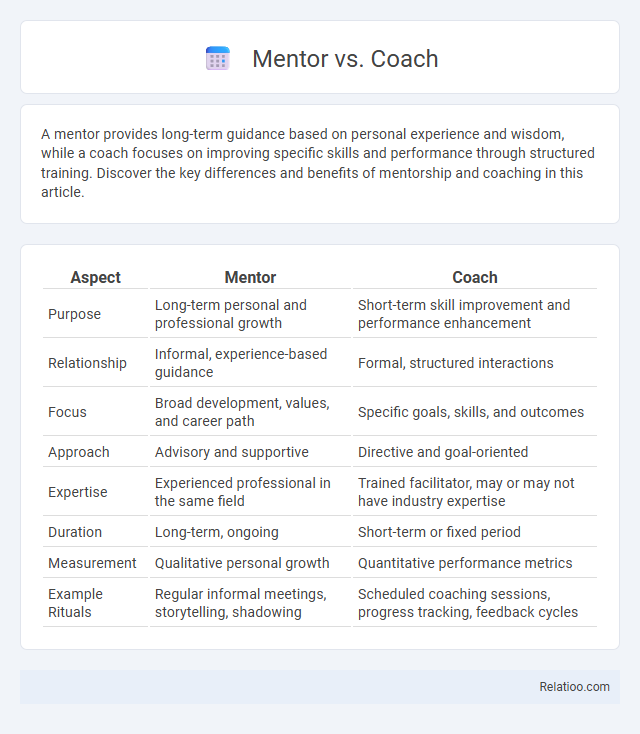A mentor provides long-term guidance based on personal experience and wisdom, while a coach focuses on improving specific skills and performance through structured training. Discover the key differences and benefits of mentorship and coaching in this article.
Table of Comparison
| Aspect | Mentor | Coach |
|---|---|---|
| Purpose | Long-term personal and professional growth | Short-term skill improvement and performance enhancement |
| Relationship | Informal, experience-based guidance | Formal, structured interactions |
| Focus | Broad development, values, and career path | Specific goals, skills, and outcomes |
| Approach | Advisory and supportive | Directive and goal-oriented |
| Expertise | Experienced professional in the same field | Trained facilitator, may or may not have industry expertise |
| Duration | Long-term, ongoing | Short-term or fixed period |
| Measurement | Qualitative personal growth | Quantitative performance metrics |
| Example Rituals | Regular informal meetings, storytelling, shadowing | Scheduled coaching sessions, progress tracking, feedback cycles |
Understanding the Roles: Mentor vs Coach
Understanding the roles of mentor and coach reveals distinct approaches to personal and professional development: a mentor provides long-term guidance based on experience and wisdom, fostering growth through advice and support, while a coach focuses on specific skills and performance improvement through structured feedback and goal-oriented methods. Mentors often build a relationship that evolves over time, emphasizing career development and personal growth, whereas coaches use targeted techniques to enhance abilities within a set timeframe. Recognizing these differences enables individuals and organizations to select the appropriate support for learning and achieving objectives effectively.
Key Differences Between Mentoring and Coaching
Mentoring involves a long-term relationship focusing on personal and professional growth, where a mentor shares experience and wisdom with you to guide career development. Coaching is typically short-term, goal-oriented, and performance-driven, emphasizing specific skills improvement through structured sessions. Unlike mentors, coaches do not necessarily have direct expertise in your field but use questioning techniques to unlock your potential and facilitate problem-solving.
Core Objectives of Mentoring
Mentoring centers on fostering long-term personal growth and career development through guidance, support, and knowledge transfer. Coaches focus on enhancing specific skills or behaviors with targeted strategies, while mentors provide broader insight and wisdom based on experience. Your core objective in mentoring should be building trust, offering constructive feedback, and inspiring continuous learning for sustained professional advancement.
Main Goals of Coaching
Coaching primarily aims to enhance Your performance and develop specific skills through personalized guidance and feedback. The main goals of coaching include clarifying objectives, building accountability, and fostering growth by addressing immediate challenges and empowering decision-making. Unlike mentoring, which focuses on long-term career development, coaching centers on achieving measurable improvements in targeted areas.
Relationship Dynamics: Mentor and Mentee vs Coach and Coachee
Mentor and mentee relationships are characterized by long-term guidance, trust-building, and knowledge sharing, focusing on personal and professional growth through experience-based advice. Coach and coachee dynamics emphasize goal-oriented, structured interactions with measurable progress, aiming to enhance specific skills or performance within a defined timeframe. While mentorship fosters a broad developmental connection, coaching concentrates on targeted outcomes supported by regular feedback and accountability.
Skills Development: Coaching Versus Mentoring Approaches
Coaching emphasizes structured skill development through targeted feedback and goal-setting, helping you enhance specific competencies rapidly. Mentoring focuses on long-term personal and professional growth by providing guidance, wisdom, and industry insights essential for career advancement. Both approaches complement each other in cultivating well-rounded expertise and leadership abilities.
When to Choose a Mentor
Choosing a mentor is ideal when you seek long-term guidance and personalized wisdom from someone experienced in your specific industry or career path, helping you navigate complex challenges and opportunities. A mentor offers deep insights, shares valuable networks, and supports your professional growth beyond immediate skill-building. Your choice to engage with a mentor should align with a desire for continuous development and strategic career advice rather than short-term performance improvement.
When to Choose a Coach
Choose a coach when seeking structured guidance to develop specific skills, achieve measurable goals, or overcome performance challenges within a set timeframe. Coaches provide targeted feedback and accountability, ideal for professional growth, leadership development, or enhancing particular competencies. Unlike mentors who offer long-term advice based on experience, coaching is best suited for focused, goal-oriented support.
Impact on Personal and Professional Growth
Mentors provide long-term guidance by sharing experience and wisdom, fostering deep personal and professional growth through ongoing support and networking opportunities. Coaches focus on specific skills and goal achievement, using structured techniques to enhance performance and encourage self-discovery in a shorter timeframe. Both roles complement each other, with mentors shaping overall development and coaches driving targeted improvements, maximizing impact on an individual's success.
Selecting the Right Guidance: Mentorship or Coaching
Choosing between mentorship and coaching depends on your specific goals and developmental needs. Mentorship offers long-term guidance and wisdom from experienced professionals to support your overall growth, while coaching provides structured, short-term strategies to improve particular skills or performance. Your decision should align with whether you seek broad career development or targeted skill enhancement.

Infographic: Mentor vs Coach
 relatioo.com
relatioo.com